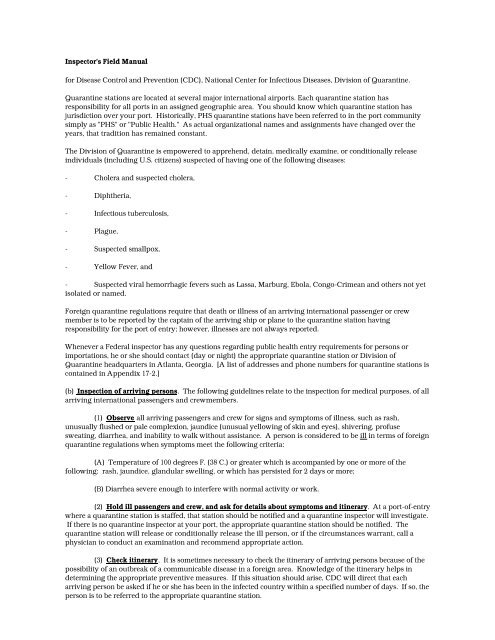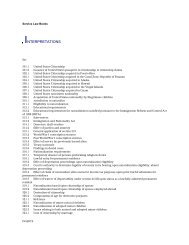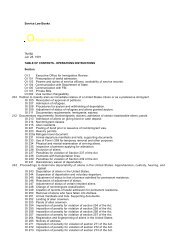You also want an ePaper? Increase the reach of your titles
YUMPU automatically turns print PDFs into web optimized ePapers that Google loves.
<strong>Inspector's</strong> <strong>Field</strong> <strong>Manual</strong><br />
for Disease Control and Prevention (CDC), National Center for Infectious Diseases, Division of Quarantine.<br />
Quarantine stations are located at several major international airports. Each quarantine station has<br />
responsibility for all ports in an assigned geographic area. You should know which quarantine station has<br />
jurisdiction over your port. Historically, PHS quarantine stations have been referred to in the port community<br />
simply as "PHS" or "Public Health." As actual organizational names and assignments have changed over the<br />
years, that tradition has remained constant.<br />
The Division of Quarantine is empowered to apprehend, detain, medically examine, or conditionally release<br />
individuals (including U.S. citizens) suspected of having one of the following diseases:<br />
- Cholera and suspected cholera,<br />
- Diphtheria,<br />
- Infectious tuberculosis,<br />
- Plague,<br />
- Suspected smallpox,<br />
- Yellow Fever, and<br />
- Suspected viral hemorrhagic fevers such as Lassa, Marburg, Ebola, Congo-Crimean and others not yet<br />
isolated or named.<br />
Foreign quarantine regulations require that death or illness of an arriving international passenger or crew<br />
member is to be reported by the captain of the arriving ship or plane to the quarantine station having<br />
responsibility for the port of entry; however, illnesses are not always reported.<br />
Whenever a Federal inspector has any questions regarding public health entry requirements for persons or<br />
importations, he or she should contact (day or night) the appropriate quarantine station or Division of<br />
Quarantine headquarters in Atlanta, Georgia. [A list of addresses and phone numbers for quarantine stations is<br />
contained in Appendix 17-2.]<br />
(b) Inspection of arriving persons. The following guidelines relate to the inspection for medical purposes, of all<br />
arriving international passengers and crewmembers.<br />
(1) Observe all arriving passengers and crew for signs and symptoms of illness, such as rash,<br />
unusually flushed or pale complexion, jaundice (unusual yellowing of skin and eyes), shivering, profuse<br />
sweating, diarrhea, and inability to walk without assistance. A person is considered to be ill in terms of foreign<br />
quarantine regulations when symptoms meet the following criteria:<br />
(A) Temperature of 100 degrees F. (38 C.) or greater which is accompanied by one or more of the<br />
following: rash, jaundice, glandular swelling, or which has persisted for 2 days or more;<br />
(B) Diarrhea severe enough to interfere with normal activity or work.<br />
(2) Hold ill passengers and crew, and ask for details about symptoms and itinerary. At a port-of-entry<br />
where a quarantine station is staffed, that station should be notified and a quarantine inspector will investigate.<br />
If there is no quarantine inspector at your port, the appropriate quarantine station should be notified. The<br />
quarantine station will release or conditionally release the ill person, or if the circumstances warrant, call a<br />
physician to conduct an examination and recommend appropriate action.<br />
(3) Check itinerary. It is sometimes necessary to check the itinerary of arriving persons because of the<br />
possibility of an outbreak of a communicable disease in a foreign area. Knowledge of the itinerary helps in<br />
determining the appropriate preventive measures. If this situation should arise, CDC will direct that each<br />
arriving person be asked if he or she has been in the infected country within a specified number of days. If so, the<br />
person is to be referred to the appropriate quarantine station.




